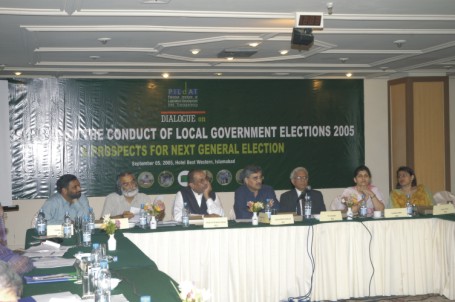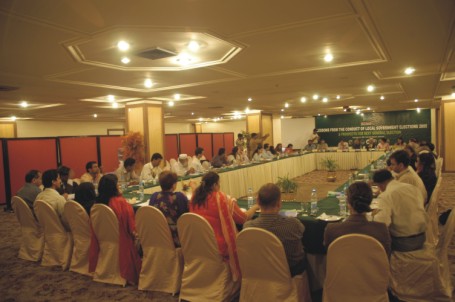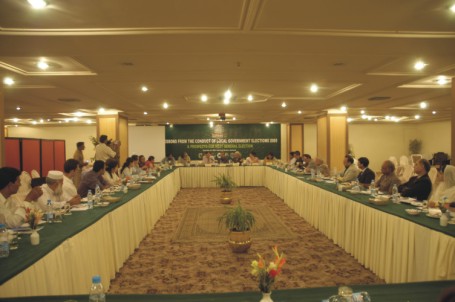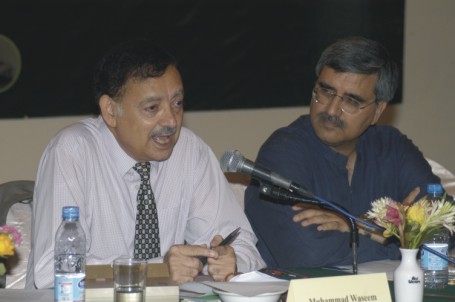|
|
| |
| EVENTS |
|
|
> Conduct of Local Government Election 2005 & Prospects of the Next General Election
|
|
|
| |
If lessons from the conduct of Local Government (LG) Election are not learnt and applied to ensure free, fair and transparent conduct of General Election in 2007, it will be catastrophic for democracy and the well-being of the country. The LG election have also made it obvious in the face of continuing flouting of the non-party character of elections by all political parties that future attempts to hold any election on non-party basis should not be made. These conclusions were drawn by the speakers and participants at the Dialogue organised by PILDAT on the �Conduct of Local Government Election 2005 and Prospects of the next General Election.�
|
|
| |
The speakers, including representatives from Civil Society and Media who monitored elections, agreed that the LG Election showed the Election Commission of Pakistan (ECP) lacked the management and administrative capacity to conduct elections which was evident from widespread examples of mismanagement such as electoral rolls, mis-printing or absence of electoral symbols of candidates on ballot papers, lack of necessary facilities in polling stations, lack of organised training to polling staff and its inability to implement election-related laws and code of conduct especially dealing with open violation of clauses such as non-party election. The ECP seemed unprepared to receive or address complaints, while delay in the compilation and publication of official results gazette also speak volumes about this lack of capacity. MNAs from ruling and ruling-coalition parties as well as those from opposition agreed that elections were not held according to the prescribed rules and laws. Even the parties such as MQM that did not press on the issue of rigging agreed that massive electoral reform was required in the light of the unsatisfactory conduct of LG election and that a permanent CEC should be appointed in consultation with all political parties and groups represented in the Parliament. MNAs from ruling PML also said lack of implementation of rules by the ECP and its administrative issues allowed massive rigging and use of power and muscle in the LG Election.
|
|
| |
The Speakers included Dr. Muhammad Waseem, renowned Political Scientist and Head of International Relations Dept., Quaid-e-Azam University, Mr. Sarwar Bari, Executive Coordinator Pattan, Ms. Gulmina Bilal, Member, Individu-land, Mr. Salman Abid, National Coordinator, Citizen�s Campaign for Women�s Representation, Aurat Foundation, Mr. M. Ziauddin, Resident Editor, Dawn Islamabad, Mr. Mujib-ur-Rehman Shami, Editor-in-Chief Daily Pakistan, Ms. Aasiya Riaz, Joint Director PILDAT and Mr. Ahmed Bilal Mehboob, Executive Director of PILDAT. The Executive Director of Human Rights Commission of Pakistan (HRCP) was invited to present HRCP�s findings but unfortunately, due to a last minute health problem, he could not participate in the Dialogue. Similarly, the Secretary Election Commission of Pakistan was invited to present ECP�s perspective. He, however, regretted after his confirmation due to some unavoidable business. The Chairman National Reconstruction Bureau was invited to lend NRB�s perspective at the Dialogue but due to to prior commitments declined to participate. |
|
| |
A total of 19 MNAs participated in the Dialogue from PML, PPPP, MQM and MMAP including Ms. Mehnaz Rafi, MNA, Mrs. Riffat Javed Kahlon, MNA, Ms. Gul-e-Farkhanda, MNA, Ms. Meena Ehsan Leghari, MNA; Mr. Zaheer Abbas Khokhar, MNA, Dr. Farooq Sattar, MNA, Kanwar Khalid Younus, MNA, Ms. Shamim Akhtar, MNA; Ms. Afsar Begum, MNA; Prof. Khalid Wahab, MNA; Mr. Khalid Iqbal Memon, MNA; Mr. Qamar Zaman Kaira, MNA; Sahibzada Harron-ur-Rashid, MNA; Mr. Farid Ahmed Paracha, MNA; Mr. Mohammad Hussain Mehanti, MNA; Mr. Asadullah Bhutto, MNA; Sayyeda Farhana Khalid Banoori, MNA and Ms. Bilquees Saif, MNA. The participants also included representatives from international development agencies, media and civil society organisations. |
|
| |
In his opening remarks, Mr. Ahmed Bilal Mehboob said that Pakistani society is getting more polarised and the country once again is at the centre of international attention and scrutiny. The question that faces us today is whether Pakistan can emerge as a politically stable country to address the greater questions of public welfare, peace and international harmony. In the face of growing international attention, we try to put up an act to convince others of our democratic, peaceful and moderate credentials but the solution lies not in putting up acts but genuinely adopting a democratic path with the unhindered participation of people as we can not weather the gathering storm without taking the people along. In this background, the recently concluded 2 phases of the Local Government Election 2005 carried double significance. One, in its own right this election should be free, fair and transparent. Second, it was to serve as an indicator of the coming General Election which are due anytime before October 2007. PILDAT strongly believes that the next general election will be extremely and critically important for the future of the country. He said that PILDAT had deliberately invited independent and non-partisan election observers and analysts to speak and present their findings before a political discussion could start with MNAs from different parties so as to hear from the people who have closely observed the conduct of Local Government Election 2005 independently and objectively. He said that the Dialogue should also ponder over the question of making it possible to observe and monitor the next general elections through a nation-wide network of indigenous and professionally trained observers. If Philippines, India, Sri Lanka, Bangladesh and Afghanistan can do it there is no reason why Pakistan should not have an indigenous independent monitoring set-up. |
|
| |
Setting the discussion in perspective, Dr. Muhammad Waseem spoke on the topic of Context of Local Government Election 2005 and the Pre-poll Scene. He said that the currently installed system of devolution negates the three Ps of Party, Province and Public. Since this system is outside the framework of 1973 Constitution, it has no constitutional basis. Similarly, since the input of public representatives had not been sought while designing this system, it also lacks legitimacy from that angle. Devolution, he said, is a provincial subject but it has been implemented by a military government which has no experience of running constitutional and political institutions. The system is obfuscating as it does not talk about from which level has it been devolved. The provinces are the ultimate victims as already limited powers of the provinces have been devolved to the districts. He said that abstract localism is a recipe for unbridled central control. He said that owing to the fetish of design in Pakistan, a model of the devolution system has been designed without analysing its impact, influence and role. Since election to the local level is held on non-party basis, the Nazim is supposed to be an isolated single unit with no links with a party or group. In contrast, however, the DCO is supposed to maintain his/her horizontal and vertical linkages to bureaucracy and the colleagues. He said the 2001 LG election only got politicised in the phase of in-direct election while in 2005, politicisation had begun from the start. This politicisation from the part of ruling elite is to ensure such a set-up of district governments which can ensure their victory in 2007 general election. He said that the opposition has succeeded to an extent in de-legitimising the exercise of LG election 2005 due to its allegations of rigging which are generally perceived by public to be true. |
|
| |
Talking about the Code of Conduct and its application in the LG Election 45%5, Ms. Aasiya Riaz said that three questions are important for examining this which include: was there an inclusive process to frame the code of conduct?; did Code of Conduct include all it was supposed to include? and did ECP effectively enforce the Code of Conduct? She said that political parties, NGOs, candidates and the public were not consulted by the ECP prior to the design of the Code of Conduct. In answering whether the Code of Conduct include all it was supposed to include, she said that the President, Prime Minister, Governors and Chief Ministers of the four provinces were excluded from the scope of clause 27 of the Code of Conduct. It is important to know why these offices were considered above the code of conduct and which aspect/points of the code of conduct applied to these offices. She emphasised that Article 16 of the code relating to the non-affiliation of the candidates with political parties was thoroughly flouted by the senior most officials, party chiefs and especially provincial governments of Punjab, Sindh and NWFP. The ECP totally turned a blind eye to this violation. Why have such a law which the ECP did not intend to enforce it. It just condones the breach of law and promotes lawlessness. Doesn�t ECP fall in this category, she questioned. Open violation of such clauses took place during election as election camps on main roads/thoroughfare; unsurpassed violence and terrorism resulting in the death toll of over 70 in the country; ceiling on expenditure of candidates; incidence of ballot box snatching, polling activity not only within the 45% meter radius but within polling stations; polling agents stamping ballots of candidates in front of polling staff; use of mobile phone by polling staff within polling stations; instances of elected officials in polling stations despite a ban, etc. In most such cases, the polling staff was not even aware of such rules so that it could protest/file complaints. The ECP has no system of monitoring to check if such violations were occurring. She said that the Election Commission of India uses a system of election monitors who are civil servants from one state to go and monitor pre-election and election phases in the other state. These act as eyes and ears of the ECI and questioned who were the eyes and ears of the ECP? She said that if the ECP continues to reject the general perception that rules and laws were not violated in these elections, the credibility of the electoral process will be irreparably damaged. |
|
| |
Ms. Gulmina Bilal said that certain lessons are learnt from the conduct of the LG Elections which need to be taken into consideration. The uncertainty surrounding the actual LG election is the first lesson whereby government started talking of holding the election in March 2005 but continued to delay it by a month at one time till such time that the schedule was announced on June 30. This uncertainty and ambiguity resulted in lack of planning on the parts of candidates. She said that the atmosphere surrounding LG Election 2005 has proved that it would be futile to plan another party-less election in the politically-charged environment of the country. She questioned government�s decision to exclude cantonments, federal capital and federally administered tribal areas from the ambit of LG Election and said that all citizens should have the same rights to vote and elect their local-level governments. Speaking on the ambiguities, she said that 6 ballots were a little too many for voters to deal with and created complications. Similarly, the electoral rolls used were those of 2001 election and it is not clear why electoral rolls of 2002 general election were not used in this election. She suggested that women police should be there in women polling stations. She also protested against the allotment of derogatory symbols (in the context of local culture) such as dog, rat and snake by the ECP to the minority candidates. The electoral exercise has made it clear that the ECP needs to be strengthened while the post of the CEC should be filled by political consultation, she suggested. She also suggested that a Complaints Cell may be formed which should be run by Civil Society Organisations (CSOs) who can negotiate between complainants and the ECP on certain issues. |
|
| |
Mr. Salman Abid said that if laws were not to be implemented by the ECP, why were they made? The lack of implementation has resulted in the loss of public credibility for the ECP which is not a good sign. He said that Aurat Foundation received and witnessed reports of massive electoral violations especially from the provinces of Punjab and Sindh but no action was taken by the ECP on those. In rural Sindh, where the number of un-opposed candidates was high, women candidates said they were discouraged from filing their nomination papers. There were cases of kidnapping and bribery too to stop opponents from contesting election in certain areas. He said the main responsibility to ensure party-less character of the election was with the government and the ECP and when it was violated, other parties followed suit. In terms of lack of administrative capacities of the ECP, he said polling staff complained of lack of stationary and other facilities while it did not have adequate training to deal with the process of voting and voting violations.
Presenting the basis of his detailed presentation Mr. Sarwar Bari said that Pattan had conducted 3792 Pre-poll voters� interviews, 129 Polling Observations, 4990 structured interviews at exit poll, 902 interviews with polling staff and 976 interviews with the polling agents and also partly relied on the ECP data, though it considered the ECP data generally unreliable. In response to Pattan�s questionnaires, 6 % of the voters had said that their thumbs were not marked with indelible ink which is a large enough number to change the results if it went for bogus voting; 41 % of the voters said that polling stations did not open at 08:00 am; 10 % of the voters said that the polling station was in a private building; 39 % of the voters said there was chaos at polling stations as compared to organised queue; 28 % of the voters said they witnessed violence at the polling stations; 30 % of the voters said the polling was temporarily closed for a certain time; 25 % of the voters said the polling agents offered them advice inside polling stations to vote for a particular candidate; 8 % said they were dissatisfied with orderliness of polling and 5 % said results from polling station would not be accurate. In terms of comparison of participation of political parties in LG elections of 2001 and 2005, he said that in 2001, MQM and JUI had boycotted election while all parties participated in 2005 LG election. Similarly the competitiveness of the parties was higher in 2005 and extended to the pre-poll phase also. The voter turnout, estimated by Pattan, was 52 % in 2001 while it stood at 43-45 % in 2005 LG election. In 2001, 14.71 Nazims were elected unopposed while in 2005, this percentage has decreased to 9.0 %; general seats had 4.5 % unopposed elected in 2001 and 2.9 % in 2005; Women elected unopposed were 24.6 % in 2001 while the percentage is 12.0 % in 2005; Peasant/Workers were 6.0 % in 2001 and 3.9 % in 2005 and Minorities elected unopposed were 24.5 % in 2001 as compared to 29.8 % in 2005. Sindh has the highest number of unopposed seats in 2005 which stood at 813, closely followed by Balochistan which has 721, Punjab 178 and NWFP 44. In conclusion he offered recommendations for Electorate centered arrangements; development of database of and inventory of polling stations; training of polling staff and development of a trained volunteer core; enhancing security arrangements; training of polling agents and release voters turn out of all women polling stations. He also demanded that investigation of reasons/factors of violence and deaths be carried out; culprits should be punished and heirs of the dead people should be paid compensation.
Mr. M. Ziauddin said that Pakistan may be the only country that witnesses such rigging and its people do not protest against it. He said that the credibility of the CEC is crucial to the entire process of election. Elections should not only be free and fair but to be seen to be free and fair. He believed that the post of the CEC should be filled through political consultation. The Acting CEC is at best a part-timer as he has responsibilities of the Supreme Court also. Under the Constitution, the President can appoint the CEC but cannot remove him, but in the case of acting CEC, the President can remove him at any time. So in essence, the President is now the CEC of the country. He questioned that when the elected Parliament is subservient to the President and there is no real transfer of power to the elected government, why local governments are created.
In the Q&A/Discussion session, Dr. Farooq Sattar, MNA said that if all complaints of the opposition are combined, only 10-15 % violations and rigging have taken place. This means that 85 � 90 % election was held free and fair. He also said that despite being a government ally, the MQM believes that the permanent CEC should be appointed at once while this slot should be filled through political consensus with all political parties represented in the Parliament. He also emphasised the need for electoral reforms including strengthening of the ECP and making it truly independent and powerful.
Ms. Mehnaz Rafi, MNA, pointed out that she witnessed many irregularities in the electoral process herself as a voter. She protested against the ECP�s decision to the use of old National Identity Cards in addition to new ones during voting as she said it created a lot of conflicts and provided opportunities for bogus voting. She also said that rigging usually takes place in women polling stations as women do not have pictures on their cards. She highlighted that copies of signed results were not given to polling agents which was their right.
Mr. Abdul Qadir, Programme Officer Friedrich Ebert Stiftung, said that if General Election is held in 2007, the country would witness 7 elections in 7 years which is a bit much. He said that media is a power to reckon with in terms of highlighting people�s issues and needs to be strengthened in the role of an independent monitor of electoral process also.
Mrs. Riffat Javaid Kahlon, MNA said that the extent of party-less elections can be gauged from the fact that PML MNAs, including herself have been sent lists of government-backed candidates for their constituencies. She said that the government is using state machinery and the bureaucracy to threaten opponents. The level of rigging is such that in her area where the number of voters is 650, the total votes cast were 850.
MNAs from MQM and MMA engaged in a heated discussion on blaming each other for rigging. Some of the other PML MNAs said that those who used force and coercion during election won their seats.
Mr. Qamar Zaman Kaira, MNA said that it is a failure of the political forces that de-politicisation of the society should take place. He said that political parties are important entities for the strength of federation, and weakening them would be tantamount to weakening of the country. He said that it is the responsibility of the parties to educate the people.
Mr. Mujib-ur-Rehman Shami said that elections raised many questions chief among which are about the management and administrative capacity of the ECP. He said that the Acting CEC says there is no difference in the powers of the permanent and the acting CEC. Mr. Shami said that had he been in the place of the acting CEC, in such a polarised atmosphere, he would have written to the President to appoint a permanent CEC with political consensus. He said that the ECP should have informed people on how to lodge complaints and advertised 24-hour help lines and fax numbers on which people should send their complaints. Instead, he said the Election Commision Office in Lahore was not even ready to receive complaints while the Acting CEC says he did not receive complaints from any quarters against violation of rules. He said that he does not remember if anybody has ever received a penalty for bogus voting. The penalty for bogus voting should be a minimum of 2 years in Jail and the penalty for changing of results by the Polling Staff should be a minimum of 10 years in Jail alongside fine. Unless such rules are made and implemented, no material difference will be witnessed in elections.
Mr. Altaf Hassan Qureshi, Editor Urdu Digest said that a political will is required to ensure free fair and transparent elections in the country. Political parties should work to create that will and build the institution of the ECP according to that.
In conclusion, Mr. Ahmed Bilal Mehboob thanked all speakers and participants. He said that no one should labour under the illusion that if the next General Election is not held in a truly free, fair, transparent and credible manner, we as a nation would get away with it. On the contrary, he held, all indications are that if free, fair and credible general election is not held in Pakistan, the country�s system and its existence may well be in peril. All state and non-state actors should work towards the objective of holding free, fair, transparent and credible election and the international friends of Pakistan should assist in this effort. |
|
| |
|
|
| |

(From Left to Right) Mr. Salman Abid, Mr. Sarawar Bari, Mr. Mujib-ur-Rehman Shami, Mr. Ahmed Bilal Mehboob, Mr. M. Ziauddin, Ms. Gulmina Bilal and Ms. Aasiya Riaz |
|
| |
|
|
| |

Participants at the Dialogue |
|
| |
|
|
| |

A view of the Dialogue |
|
| |
|
|
| |

Dr. Muhammad Waseem addressing the Dialogue |
|
|
|
|
|
|
|
|